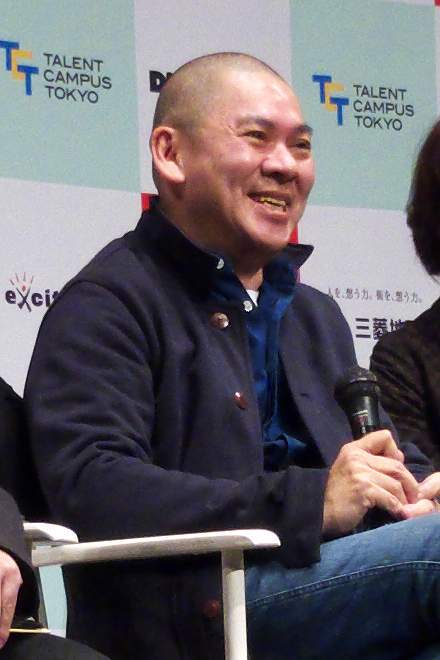
Goodbye, Dragon Inn 2004
Directed by

Ming-liang Tsai
Made by

Wellspring Media
Goodbye, Dragon Inn Plot Summary
Read the complete plot summary and ending explained for Goodbye, Dragon Inn (2004). From turning points to emotional moments, uncover what really happened and why it matters.
The Fu He Grand Theater, a dilapidated movie palace located in Taipei, is on the brink of closure. With its leaky roof and unkempt bathrooms, it only employs a couple of dedicated staff members: a male projectionist and a female ticket attendant. Interestingly, this venue is widely recognized as a gay cruising location in the city, a fact reflected in its almost deserted halls. On its final day of operation, the theater plays host to a screening of the legendary 1967 film, Dragon Inn, directed by King Hu, yet the event goes largely unnoticed, with little to no audience to celebrate the occasion.
The ticket attendant, portrayed by Kuei-Mei Yang, gingerly navigates her way through the damp hallways to deliver a steamed bun to the projectionist, played by Chao-jung Chen. When she arrives at the projection room, she finds herself alone. Tempted to leave the bun on the table for him, she ultimately decides against it and walks away with the treat in hand.
Meanwhile, a Japanese tourist, who appears eager to engage with others in the theater, tries his luck at cruising both in the seating area and the men’s bathroom. Despite encountering a few patrons, he finds no success in his pursuits. He follows Chen into a storage room, seeks camaraderie by offering a light for his cigarette, and learns from Chen that the theater is haunted. When the tourist suggests a more intimate encounter, Chen politely declines.
In a nearly vacant theater, a lone female patron tries her best to remain discreet as she makes her way through the aisles. She awkwardly situates herself next to the tourist, who has resigned to watching the movie after giving up on cruising. However, her noisy eating soon becomes a distraction, prompting the tourist to abruptly depart.
As the plot of Dragon Inn builds tension toward its climax, we briefly shift focus to former stars of the film, Miao Tien and Shih Chun (both played by talented actors). Miao spends time with his grandson, while Shih becomes visibly emotional, reflecting on the nostalgia tied to the film.
Once the movie concludes, the diligent ticket attendant returns to her duties, switching on the lights and meticulously sweeping the floor. The camera remains fixed on the now-empty theater for several poignant moments, capturing a sense of profound loss. Miao and Shih chat about the fading interest in cinema and how memories of the past slowly vanish into obscurity.
As the evening draws to a close, the projectionist and ticket attendant begin the closing process. They rewind the last reel of film, clear out the trash, and empty the rainwater collecting in buckets — all actions steeped in the reality that the theater will never again welcome an audience. Lost in their thoughts, the ticket attendant gazes at a poster reading “Temporarily out of business” and gives her booth a final, lingering glance before departing. She leaves the steamed bun for the projectionist, who is seen driving away into the night. From the shadows, she watches him go, holding onto a bittersweet sentiment as she walks home alone in the rain.
Goodbye, Dragon Inn Timeline
Follow the complete movie timeline of Goodbye, Dragon Inn (2004) with every major event in chronological order. Great for understanding complex plots and story progression.
The Last Day of Business
The Fu He Grand Theater, a dilapidated movie palace in Taipei, prepares for its final day of operation. This day marks the end of an era, as the theater is known for its crumbling infrastructure and has few patrons.
Screening of Dragon Inn
On its last day, the theater screens King Hu's classic film, Dragon Inn, but disappointingly, few patrons can be seen in attendance. The lack of fanfare highlights the theater's decline and the nostalgia surrounding its history.
The Ticket Attendant's Task
The female ticket attendant makes her way through the decaying hallways, carrying a steamed bun for the projectionist. Her routine reflects the loneliness and dedication found in a theater fading into obscurity.
The Projection Room Wait
As the ticket attendant reaches the projection room, she finds the projectionist absent. Contemplating leaving the bun for him, she ultimately decides to take it back and walk away, symbolizing the fading connection between the staff.
The Japanese Tourist
A Japanese tourist enters the theater hoping to find companionship, navigating the known cruising spots within the hall. Despite his efforts, he finds no success, reflecting on the theater's changing dynamics and audience.
A Ghostly Encounter
While attempting to connect with Chen Chao-jung in a storage room, the tourist learns about the theater's haunting reputation. Chen's rejection of the tourist's advances highlights the struggles and desperation within the space.
A Female Patron's Discomfort
One of the few attendees, a female patron, tiptoes through the nearly empty theater in an attempt to avoid drawing attention. When she approaches the tourist, her noise while eating leads him to abandon his spot, illustrating the awkwardness of the setting.
Emotional Reflection during Dragon Inn
As Dragon Inn reaches its climax, the original actors, Miao Tien and Shih Chun, watch from the audience. Their emotional reactions speak volumes about the nostalgia and memories tied to the film and the theater itself.
After the Film Ends
Post-screening, the ticket attendant dutifully turns on the lights and sweeps the empty floor, signifying the end of operations. The lingering camera on the deserted theater evokes a sense of nostalgia and melancholy as nobody seems to care anymore.
Closing the Theater
As the night falls, the projectionist and ticket attendant share a final moment while closing up the theater. They rewind the film and take out the trash, a bittersweet reminder of the theater's impending closure.
Final Farewell
The ticket attendant sees one last poster declaring the theater 'Temporarily out of business' and takes a moment to absorb her surroundings. This moment becomes a poignant goodbye as she walks away, leaving behind a place filled with memories.
The Projectionist's Departure
From the shadows, the ticket attendant watches the projectionist drive away, carrying the steamed bun she left for him. This act symbolizes not only their bond but also the heart-wrenching end of an era for the theater.
Walking Home in the Rain
The ticket attendant walks home alone, enveloped by the rain that mirrors her sorrow. The final scene encapsulates the desolation and the memories tied to the theater as she leaves behind a significant chapter of her life.
Goodbye, Dragon Inn Characters
Explore all characters from Goodbye, Dragon Inn (2004). Get detailed profiles with their roles, arcs, and key relationships explained.
Ticket Attendant
The Ticket Attendant is a weary yet dutiful worker at the Fu He Grand Theater, embodying the spirit of perseverance amidst decline. She is often lost in thought and displays a sense of longing for the connections once fostered in the theater. Her small gestures, like bringing food to the projectionist, highlight her quiet affection and dedication.
Projectionist
The Projectionist is one of the two main employees at the theater, characterized by his deep connection to the films he shows. He is introspective and often caught in his thoughts, symbolizing the struggle of keeping the art of cinema alive. His interactions with the Ticket Attendant reveal a shared history and unspoken emotions.
Chen Chao-jung
Chen Chao-jung is a character who embodies the themes of loneliness and missed connections. His interactions with a Japanese tourist illustrate the struggles of modern relationships in a digital age. Through his conversation about the haunted theater, he reflects on the eerie transience of life and film, making him a poignant presence in the story.
Miao Tien
Miao Tien, an actor from the original 'Dragon Inn,' represents the enduring legacy of cinema. His emotional visit with his grandson during the final screening encapsulates the theme of remembrance. His tears showcase how deeply intertwined personal memories are with films, marking the end of an epoch in both life and film.
Shih Chun
Shih Chun, another actor from 'Dragon Inn,' reflects on the impact of cinema as he engages in deep conversations with Miao Tien. His emotional response emphasizes the nostalgia and cultural significance of films, highlighting how their magic endures even in a fading industry. His sensitivity adds depth to the overarching themes of the movie.
Goodbye, Dragon Inn Settings
Learn where and when Goodbye, Dragon Inn (2004) takes place. Explore the film’s settings, era, and how they shape the narrative.
Time period
The movie does not specify a distinct time period, focusing instead on contemporary themes of nostalgia and loss. It captures a moment in time as the theater approaches its closure, reflecting a broader societal change in the appreciation of traditional cinema.
Location
Fu He Grand Theater, Taipei
The Fu He Grand Theater is a dilapidated movie palace located in Taipei. It is known for its run-down facilities and serves as a nostalgic representation of the fading cinema culture. Once a vibrant hotspot, the theater has now become primarily recognized as a gay cruising spot, reflecting the shift in its audience and purpose over the years.
Goodbye, Dragon Inn Themes
Discover the main themes in Goodbye, Dragon Inn (2004). Analyze the deeper meanings, emotional layers, and social commentary behind the film.
💔
Nostalgia
Nostalgia is a prominent theme in the film, as it portrays the emotional weight of an era passing. The characters' interactions and the theater's decay symbolize a longing for the past, highlighting how cultural spaces can hold collective memories. The final screening of 'Dragon Inn' serves as a poignant reminder of the joy and connection once found in cinema.
🚪
Isolation
Isolation permeates the atmosphere of the Fu He Grand Theater. Despite being a public space, the nearly empty theater and solitary interactions reflect the loneliness of the characters. This theme is amplified by the ticket attendant and projectionist's experiences, emphasizing human connection’s fragility in an increasingly disconnected world.
Featured on this page

What's After the Movie?
Not sure whether to stay after the credits? Find out!
Explore Our Movie Platform
New Movie Releases (2025)
Famous Movie Actors
Top Film Production Studios
Movie Plot Summaries & Endings
Major Movie Awards & Winners
Best Concert Films & Music Documentaries
© 2025 What's After the Movie. All rights reserved.




